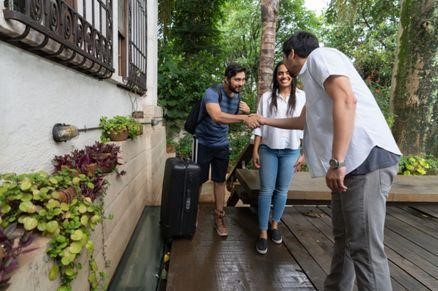General Insurance Blogs, Articles & Updates by - Magma Insurance
Have us call you
- RENEW YOUR POLICY
- BUY NEW POLICY

Guide to make your first ever flight journey more exciting and less daunting
Flying thousands of feet up in the air for the first time is always one of the best experiences in life. Picking a window seat for stunning views, excellent food, comfort, and convenience are a few things you can associate with air travel. When you are boarding a plane for the first time, you have different emotions; your eyes sparkle with anticipation, your heart races with delight, but there is a lot of confusion that daunts you. Few of us wait impatiently for our first ever flight journey, whereas others are a bit worried, and it is natural.
So, to prepare you for this incredible experience, we have put together a guide that will make your first-ever flight journey more exciting and less daunting.
1. Turbulence is normal:
Even regular flyers are still afraid of turbulence, but it is nothing to be scared of. Engineers design the planes to undergo much more shaking than you could have imagined.
2. Arrive early:
Usually, people adhere to the reporting times given by the airlines. Still, being early for your first flight makes you a little more relaxed to adjust to the atmosphere at the airport. The spare time lets you complete the baggage check-in, collect boarding cards, security formalities and cross the immigration counter with ease.
3. Know about the airline's luggage policy:
How much luggage would you be allowed? How much should they weigh? What all things are you restricted to travel with? What if your luggage is misplaced? Acquaint yourself with all these important guidelines to avoid chaos.
4. Not all noises indicate dysfunctional aircraft parts:
Commercial planes are super complex machines. And it is pretty normal for devices to be noisy. For example, when retracted or deployed, the landing gear sounds like a thud that usually startles people. But, even the engine will be relatively quieter once the aircraft is in the air at a certain altitude.
5. Prepare yourself for motion sickness:
The likelihood of having it in mid-air is less because you do not experience twists or turns as you do in a car or a bus. But, some people have aerophobia that makes them feel sick and anxious mid-air. There are air sickness bags in each seat, and you can bring pills for yourself.
6. Choose your seat according to your liking:
Window seats let you peep outside with a few of the most sensational sights; on the other hand, aisle seats give you the option to take a walk more frequently during the journey. Consider your choices if you get the liberty to select your seat.
7. Carry these useful items:
Bring good noise-cancelling headphones, eye masks or neck pillow with you if you wish to have a few good hours of pleasant sleep. Use onboard entertainment music to engage you throughout your flight and make you rejoice in the journey with the melody of beats.
8. Comfortable dressing:
Aircraft's economy class seats are not the most luxurious ones out there. So, for a comfortable journey, choose breathable and stretchable clothes and footwear; think about the weather too.
9. Keep your cabin baggage light:
Wisely choose what you will pack in your cabin baggage. Remember to put the liquids, medicines, wallet, and electronics on top as, during checking, you might have to remove them for inspection.
The first trip can be a nervous one, but if you're confident and enthusiastic, you'll never say 'no' to flight journeys. Everyone has had an enjoyable first flight experience that becomes a story that they often recollect.
Also, as you pack your bags, it is essential to ensure some security in terms of insurance before boarding a flight. We recommend having general insurance plans as these will prove to be helpful all the time. General insurance plans include protection for your travel and will be beneficial to cover passport loss, any loss of baggage, or medical emergencies. So, keep the worries aside, and get ready to check in for your first flight experience!
Are you travelling internationally for the first time? Click HERE to know about the essential travel insurance.
Disclaimer: The information provided above is for illustrative purposes only. To get more details, please refer to policy wordings and prospectus before purchasing a policy.

What is constructive total loss in two-wheeler insurance.
Whether you own a two-wheeler or a car, you should always ensure that you know everything about its maintenance and insurance. Getting insurance for your vehicle is of utmost importance. It protects your vehicle from severe damages by giving you compensation and solves third-party disputes.
However, just getting insurance for your vehicle is not enough. You also need to check out the various additional services offered by the insurance. This way, you can choose the most comprehensive insurance for your 2 wheeler. You must also inquire about all the essential terms relevant to your insurance. One such term is a constructive total loss. Although the term sounds complicated, it is not.
This article will help you to understand various aspects of a constructive total loss.
What is a constructive total loss?
You will likely file a claim for your 2 wheeler insurance only when your vehicle has suffered severe damages. Once you have filed a claim, the insurance company will inspect all the damages and reimburse the amount accordingly. Either you will get cashless compensation or money for the repairs. The damage is assessed well, and only compensation for the damages is provided.
If the vehicle is in dire need of minor repairs or servicing, the insurance company will reimburse that. It can also refund the amount for the replacement of bike parts. However, reimbursement only occurs after all the deductibles are assessed carefully. No matter the damage's severity, you will only get compensation up to the Insured Declared Value or IDV. You will not get any claim money that exceeds the IDV value.
There is also a major catch here. For instance, your two-wheeler undergoes irreversible damage. In such a case, the bike will be beyond repair. The insurance company can then declare it as a total loss. In other words, if the repair cost for the vehicle far exceeds its value, it results in total loss.
It is said that when the repair cost is more than 75% of the IDV, it is impossible to reimburse it. The constructive total loss takes place here.
Let's assume that your two-wheeler gets stolen. Then what will happen? In such a case, your insurance company will reimburse you for the IDV of your vehicle. The claim for theft of your bike will be treated as a total loss claim. The reimbursement amount will be sans the deductibles and depreciation.
How do you apply for a constructive total loss claim?
Now that you are familiar with constructive total loss let's look at the various steps to file a claim. They are:
● Go to the official website of your insurance company
● Look for the claims process tab or page
● You will see blanks to fill in your information
● Provide all the necessary information carefully
● After that is done, verify the self-inspection of your bike through the link sent to your mobile number
● A surveyor or inspector may be sent to get your vehicle inspected. Cooperate with them
● Once everything is done, you can submit all the required documents and forms
These easy steps can get you a total claim from the comfort of your home. You need to keep all these things in mind before you file a claim for your 2 wheeler insurance under constructive total loss. Once you give the correct information and abide by the guidelines, you can access the claim amount.
Click HERE to buy 2 wheeler insurance to protect your motorcycle from unexpected damages.
Disclaimer: The information provided above is for illustrative purposes only. To get more details, please refer to policy wordings and prospectus before purchasing a policy.

Safety Tips Before Going on a Trip
There really isn’t the right time to go on a trip. Sure, you might need to take fewer leaves from work or school if it’s sometime in June or December when everyone is on vacation. But a vacation is a vacation. And it’s an exciting time; you are busy making plans about all that you’d do once you get there, all that you need to buy before leaving, packing up your suitcase and other such things. But that isn’t all. You shouldn’t get so absorbed in making all the plans that you forget to be thoroughly prepared for the trip. For instance, to safeguard your car when you are on your vacay, you should get it insured from the best car insurance company in India. There are some tips you should always keep in mind when travelling, no matter where. Some of them are as follows:
- Keep your belongings in a secure place: When you are travelling, there are chances of being pick-pocketed. Try keeping your wallet and identity proof in an inside pocket if possible or keep your bag towards the front side if they are kept in there. When staying in a hotel or hostel, do not keep your belongings scattered around and keep your luggage locked at all times. If you are travelling abroad, keep your passport and other documents in a locker if available.
- Be aware of your surroundings: Make sure to research well about where you’d be staying. Do not forget to find out details about the area where you’d be lodging. If you don’t, you might end up staying in an unsafe or dangerous neighbourhood. In case you do end up in such an area, try not to go out after dark, especially alone.
- Keep people informed: Whether you are travelling alone or with friends or family, it is always a really good idea to let people know where you are and what you generally intend to do that day. This way, in case something were to happen, or you aren’t able to contact anyone during an emergency, they would know where you are and can perhaps get to you or could inform the authorities if need be.
- Be careful when using public Wi-Fi: It is great to have Wi-Fi around you, so you don’t need to use up your mobile data but be careful when connecting to it. If you end up connecting to a network that isn’t secure, you could fall prey to hackers who might steal important information from your phone such as bank details or might even obtain your house address etc. It is key that you practise caution when using an unknown network since you could become a victim of cyber-crime.
- Beware of strangers: There is absolutely nothing wrong with making friends when out on vacation. In fact, it is great to make friends in different places. However, you mustn’t trust just anybody you meet. You can never really know - someone’s intentions so you must avoid giving out personal information or going just about anywhere with people you have just met.
Trips are a great way to destress and just have a good time, but it is necessary to be careful when travelling. You must take good care of your things, including your vehicles. For instance, if you plan a road trip with your friends, do not forget to choose the best car insurance company in India, so you are protected in case of a problem.

Risks and rewards before converting your apartment into a paying guest accommodation
There's no room for an apple to fall, especially in Indian cities. Cities are buzzing with a huge population of students and working professionals. We often see our family and friends move out of their hometowns to turn over a new leaf. Some flee to pursue their dreams, and some to live independently.
This appears like a window of opportunity for the apartment owners to give their flats as paying guest accommodation. This way, they can earn well and gain the confidence to drive a small business. Being a highly rewarding sector, some individuals have already started to build their brands on PG accommodations. Their presence gives us a clear hint about the opportunities and profitability of this sector.
All in all, it's a booming industry. This fear of missing out in the market makes people convert their apartments to paying guest accommodations. But isn't it essential to know the risks and rewards before deep diving into this sector? Don't worry. We have got you covered.
Risks:
1. Legalities:
Converting your residence into a PG accommodation states that you are renting it for commercial purposes. Commercial properties require compliance with certain formalities and permission from municipal authorities, police, fire department, etc.
2. Security:
To prioritise the tenants' safety, ensure the installation of CCTV cameras and appoint a guard for additional security, and maintain the records of visitors.
3. Background check:
It is crucial to know your paying guests before closing the deal. So, verify their official documents, such as Aadhaar card, PAN card, passport, or authorised identity card, and keep additional photocopies of these with you for records and future reference.
4. Agreement:
The rent agreement serves as an official document of mutual understanding between the occupant and the landlord. You need to mention all the terms in the contract. Once the contract is signed, you can move to the next step of closing the deal.
5. Damage to property:
The tenant should be responsible for maintaining the original condition of the PG except for everyday wear and tear. In case of any damage, it should immediately be brought to the landlord's notice.
As a landlord, you can insure your apartment with home insurance which would safeguard your property in case of any burglary, fire, or natural calamity.
Rewards:
1. Greater monetary benefits:
PG business can be a money-spinner for you. On average, a PG accommodates 5-6 individuals. So, a PG can earn you up to 10x of what you could make by renting out the apartment. Paying guest accommodations in metropolitan cities can earn you between 6,000 to 50,000; for other cities, it can range from 3000 to 20,000 per head per month. This can be an excellent source of side income that can be a significant financial benefit, especially for the middle class.
2. Passive income source:
PG can be a great passive income source for you while you can continue your own job/business. Converting your apartment into paying guest accommodation would be an excellent decision. However, complete all the necessary procedures and legal issues before converting it to a PG.
Don't forget to undertake the safety of your apartment by investing in home insurance, which would protect your belongings and your apartment from damages that mostly occur due to natural disasters and/or manmade misadventures.
If you have a good living space that is not occupied, then PG renting is a good decision you can make to get monetary benefits from your asset. But it is important to be clear on the terms before dealing with tenants. Never trap yourself in a problematic situation by making rash decisions.
Do your best research and background check of the desired tenant and stay updated on your home insurance renewal. Follow these basic yet vital steps, and you are all set to rent your apartment.
Click HERE to buy the best home insurance policy for your PG accommodation.
Disclaimer: The information provided above is for illustrative purposes only. To get more details, please refer to policy wordings and prospectus before purchasing a policy.

